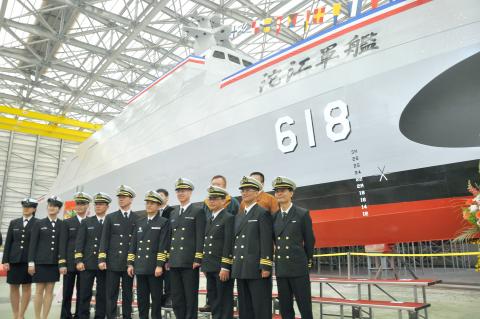The nation’s first stealth missile corvette was christened yesterday — a development that is expected to give the Republic of China Navy (ROCN) the capability to counter larger enemy warships.
The 500-tonne Tuo River (沱江) is the first of possibly 12 ships to be built locally under the Hsun Hai (迅海, Swift Sea) program.
The twin-hull corvette, described as a “carrier-killer” by local media, has a maximum speed of 38 knots (70kph) and a range of 2,000 nautical miles (3,704km). Its speed and low radar signature allows the corvette to get close to enemy targets, experts said.

Photo: CNA
The ship, 60.4m in length and 14m wide, carries a crew of 41. Its armaments include Hsiung Feng II and Hsiung Feng III anti-ship missiles.
The newly developed 500-tonne catamaran had been compared to China’s Type 022 Houbei fast attack missile ship, also a catamaran, due to similarities in their design.
When asked about the comparison yesterday, Republic of China Navy Admiral Chen Yung-kang (陳永康) said the Tuo River missile corvette was “infinitely better” than China’s Type 022.
According to Lung De Shipbuilding Co, the Tuo River is a modulated ship and welded together from 40 separately produced parts and sections.
It is also the first catamaran to be constructed from aluminum alloy.
The missile corvette’s range of 2,000 nautical miles would enable it to make a round-trip patrol from Taiwan to Itu Aba (Taiping Island, 太平島) in the South China Sea, the ROCN said.
The addition of the ship would help greatly in routine patrols to the South China Sea region, it added.
Chen also said the impetus in designing the ship was to produce a highly mobile missile corvette with large missile bays and greater range, and with strong striking and stealth capabilities.
“One of the reasons to emphasize building our own naval warships is to upgrade our overall naval defense capabilities, as well as strengthen the navy’s surface-to-surface combat abilities,” Chen said.
Yesterday’s christening ceremony was held indoors in Suao (蘇澳), Yilan County, and the ship is to undergo final tests and reviews before it is officially launched.
It is expected to be deployed in the first half of next year.
In 2011, the legislature approved a NT$24.98 billion (US$853.4 million) budget to fund the construction of between seven and 11 corvettes, but a fleet of 12 ships is expected to be built.

AIR SUPPORT: The Ministry of National Defense thanked the US for the delivery, adding that it was an indicator of the White House’s commitment to the Taiwan Relations Act Deputy Minister of National Defense Po Horng-huei (柏鴻輝) and Representative to the US Alexander Yui on Friday attended a delivery ceremony for the first of Taiwan’s long-awaited 66 F-16C/D Block 70 jets at a Lockheed Martin Corp factory in Greenville, South Carolina. “We are so proud to be the global home of the F-16 and to support Taiwan’s air defense capabilities,” US Representative William Timmons wrote on X, alongside a photograph of Taiwanese and US officials at the event. The F-16C/D Block 70 jets Taiwan ordered have the same capabilities as aircraft that had been upgraded to F-16Vs. The batch of Lockheed Martin

GRIDLOCK: The National Fire Agency’s Special Search and Rescue team is on standby to travel to the countries to help out with the rescue effort A powerful earthquake rocked Myanmar and neighboring Thailand yesterday, killing at least three people in Bangkok and burying dozens when a high-rise building under construction collapsed. Footage shared on social media from Myanmar’s second-largest city showed widespread destruction, raising fears that many were trapped under the rubble or killed. The magnitude 7.7 earthquake, with an epicenter near Mandalay in Myanmar, struck at midday and was followed by a strong magnitude 6.4 aftershock. The extent of death, injury and destruction — especially in Myanmar, which is embroiled in a civil war and where information is tightly controlled at the best of times —

China's military today said it began joint army, navy and rocket force exercises around Taiwan to "serve as a stern warning and powerful deterrent against Taiwanese independence," calling President William Lai (賴清德) a "parasite." The exercises come after Lai called Beijing a "foreign hostile force" last month. More than 10 Chinese military ships approached close to Taiwan's 24 nautical mile (44.4km) contiguous zone this morning and Taiwan sent its own warships to respond, two senior Taiwanese officials said. Taiwan has not yet detected any live fire by the Chinese military so far, one of the officials said. The drills took place after US Secretary

THUGGISH BEHAVIOR: Encouraging people to report independence supporters is another intimidation tactic that threatens cross-strait peace, the state department said China setting up an online system for reporting “Taiwanese independence” advocates is an “irresponsible and reprehensible” act, a US government spokesperson said on Friday. “China’s call for private individuals to report on alleged ‘persecution or suppression’ by supposed ‘Taiwan independence henchmen and accomplices’ is irresponsible and reprehensible,” an unnamed US Department of State spokesperson told the Central News Agency in an e-mail. The move is part of Beijing’s “intimidation campaign” against Taiwan and its supporters, and is “threatening free speech around the world, destabilizing the Indo-Pacific region, and deliberately eroding the cross-strait status quo,” the spokesperson said. The Chinese Communist Party’s “threats